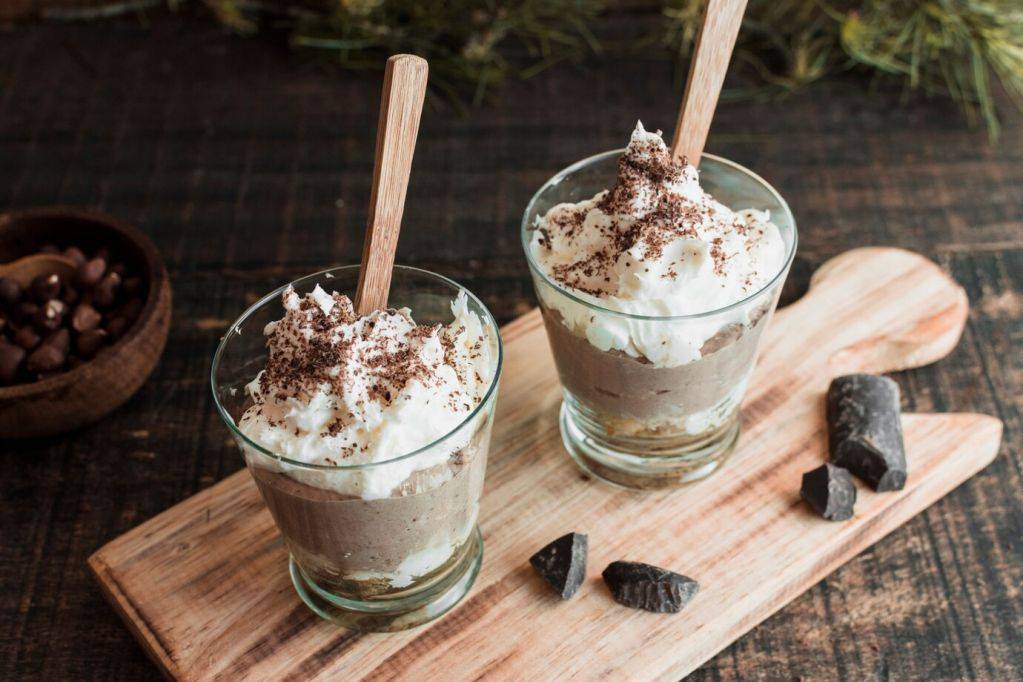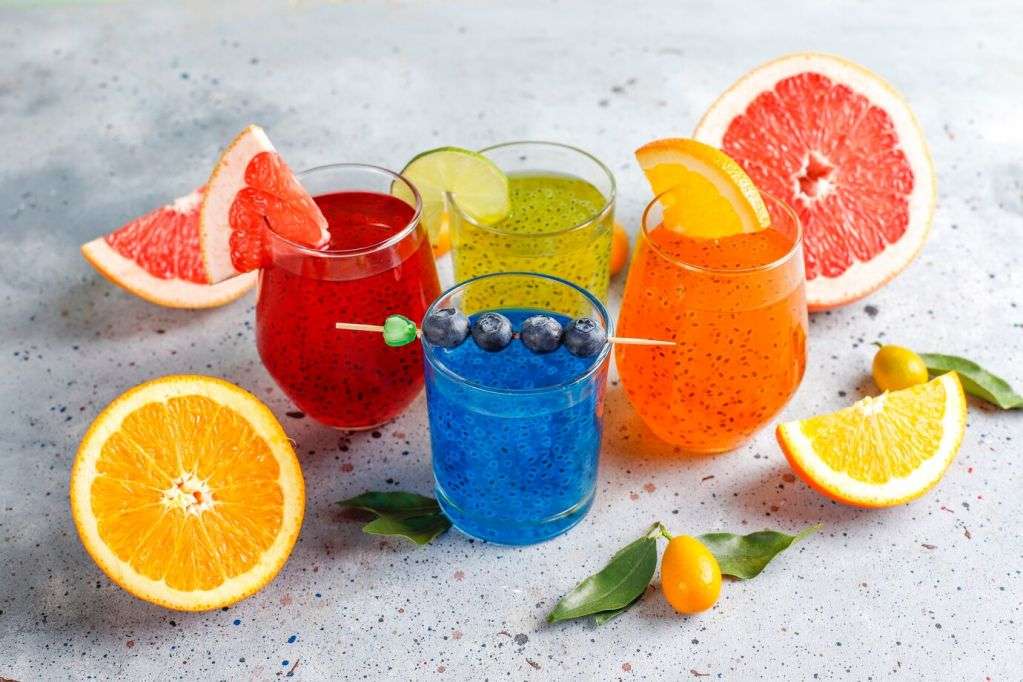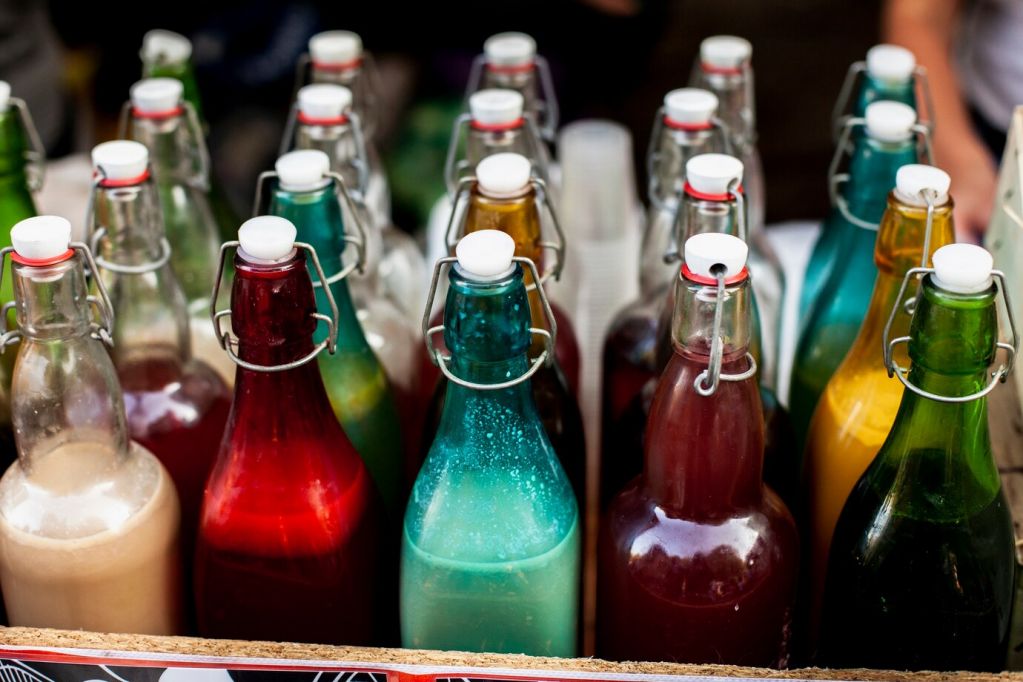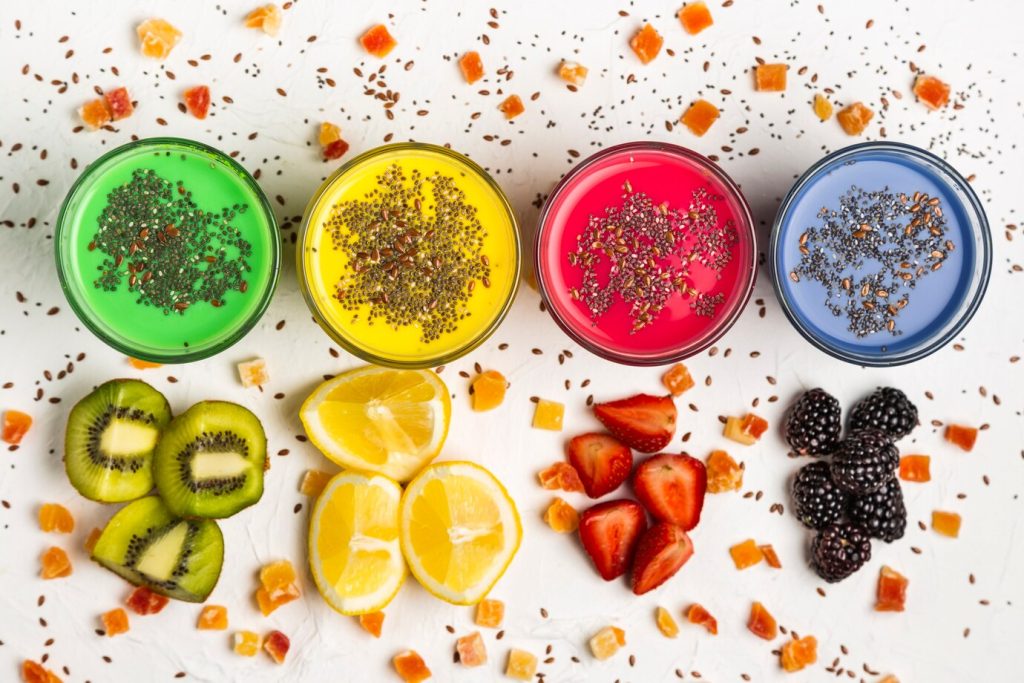Beverages, from sodas to juices and teas, often contain a variety of additives that enhance flavor, improve texture, extend shelf life, and add color. Below is a comprehensive guide that discusses the common types of food additives used in beverages, along with five examples for each type, including their introduction and recommended dosage.
Types of Food Additives in Beverages
Food additives are categorized based on their function in beverages. The most common types include:
- Sweeteners: Sweeteners enhance the taste of beverages without the added calories of sugar or provide a specific flavor profile.
- Preservatives: By stopping the growth of microorganisms like bacteria, yeasts, and molds, these chemicals are used to increase the shelf life of drinks.
- Colorants: Colorants are used to give beverages a more appealing appearance, which can influence consumer preference and perception.
- Acidulants: Acidulants are added to beverages to provide a tart or sour taste, improve flavor, and maintain the stability of the product.
- Flavorings: These additives are used to impart or enhance the natural flavors in beverages, making them more palatable and enjoyable.
Every category contributes to the beverage’s overall quality and safety in a certain way.
Sweeteners
Sweeteners are additives used to enhance the sweetness of beverages without adding calories (in the case of artificial sweeteners) or with controlled caloric content (in natural sweeteners). They are crucial in beverages like sodas, juices, and diet drinks.
Aspartame
- Less than 200 calories, aspartame is an artificial sweetener with a high sweetness content. It is frequently found in sugar-free and diet drinks.
- Suggested Dosage: 50 mg of aspartame per kilogram of body weight is the daily dosage that the FDA has allowed. This translates to around 3.5 grams for a 70 kg adult.
Sucralose
- About 600 times sweeter than sugar, sucrose is a non-caloric sweetener. It may be used with a range of drinks because of its temperature stability.
- Suggested Dosage: For an individual weighing 70 kg, the acceptable daily intake (ADI) for sucralose is 5 mg per kilogram of body weight or approximately 350 mg.
Stevia
- Stevia is a natural sweetener derived from the leaves of the Stevia rebaudiana plant. It is thought to be a superior replacement for artificial sweeteners since it is 200–300 times sweeter than sugar.
- Recommended Dosage: The ADI for stevia glycosides is 4 mg per kilogram of body weight, equating to about 280 mg for a 70 kg person.
Acesulfame Potassium (Ace-K)
- Acesulfame potassium is a calorie-free sweetener that is about 200 times sweeter than sugar. It is frequently used with other sweeteners to give food a more sugary flavor.
- Recommended Dosage: The ADI for Ace-K is 15 mg per kilogram of body weight, equivalent to 1,050 mg for a 70 kg adult.
Monk Fruit Extract
- Siraitia grosvenorii fruit yields monk fruit extract, a naturally occurring sweetener that is 150–200 times sweeter than sugar. It has become popular because of its natural origin and calorie-free composition.
- Recommended Dosage: There is no established ADI for monk fruit extract, but general consumption levels are considered safe when used according to product guidelines.
Preservatives
Preservatives are essential for extending the shelf life of drinks because they prevent the formation of mold, yeast, and bacteria. They help maintain the safety and freshness of beverages over time.
Sodium Benzoate
- Sodium benzoate is a widely used preservative in acidic beverages like sodas, fruit juices, and energy drinks. It stops the growth of bacteria, fungi, and yeast.
- Recommended Dosage: The maximum allowable concentration in beverages is 0.1% (1,000 mg per liter).
Potassium Sorbate
- To stop yeast and mold from growing in drinks, use potassium sorbate. It is frequently present in fruit-flavored beverages, wines, and sodas.
- Recommended Dosage: The acceptable concentration is 0.02% to 0.1% (200 to 1,000 mg per liter), depending on the beverage type.
Calcium Propionate
- Calcium propionate is effective against mold and some bacteria and is often used in fruit juices and dairy-based beverages.
- Recommended Dosage: The typical dosage is 0.1% to 0.3% (1,000 to 3,000 mg per liter).
Sorbic Acid
- Sorbic acid is a natural preservative commonly utilized to prevent the growth of mold, yeast, and fungi in a variety of beverages, especially fruit juices and sparkling waters.
- Recommended Dosage: The recommended dosage ranges from 0.02% to 0.1% (200 to 1,000 mg per liter).
Sulfur Dioxide (SO2)
- Sulfur dioxide is used primarily in wines and fruit juices to prevent microbial growth and oxidation, which can affect flavor and color.
- Recommended Dosage: The maximum permissible limit for sulfur dioxide in beverages is 350 ppm (parts per million).
Colorants
Colorants are incorporated into beverages to enhance or recover their visual appeal. They enhance the visual appeal of drinks and can also be used to maintain consistent color in natural beverages.
Caramel Color (E150)
- Caramel color is a commonly used colorant in soft drinks, especially colas. It is made by heating sugar, and it gives beverages a brown hue.
- Recommended Dosage: The dosage varies, but it is generally used at levels up to 100 mg per liter in beverages.
Beta-Carotene
- Beta-carotene is a natural colorant derived from carrots and other orange-colored vegetables. It gives beverages an orange-yellow color and is often used in fruit drinks.
- Recommended Dosage: The usage level can range from 1 mg to 10 mg per liter, depending on the desired intensity of color.
Anthocyanins
- Anthocyanins are natural pigments extracted from berries and grapes, providing red, purple, or blue colors to beverages.
- Recommended Dosage: The dosage typically ranges from 10 mg to 50 mg per liter, depending on the beverage and desired color.
Curcumin
- Curcumin is the primary pigment found in turmeric, providing a yellow color. It is often used in juices and health drinks for both color and perceived health benefits.
- Recommended Dosage: The typical usage level is around 50 mg per liter.
Chlorophyll
- Introduction: Chlorophyll is a green pigment derived from plants and is used to give beverages a natural green hue, often in health drinks and smoothies.
- Recommended Dosage: The recommended usage level is between 10 mg and 100 mg per liter, depending on the intensity of the color.
Acidulants
Acidulants are additives that enhance the tartness and flavor of beverages while also acting as preservatives by lowering the pH, which inhibits microbial growth. They are commonly used in sodas, fruit juices, and sports drinks.
Citric Acid
- Citric acid is the most common acidulant used in beverages. It provides a tangy flavor and is found in fruit juices, soft drinks, and flavored waters.
- Recommended Dosage: The typical dosage ranges from 0.1% to 0.3% (1,000 to 3,000 mg per liter).
Malic Acid
- Malic acid is found naturally in apples and gives a smooth, long-lasting tartness to beverages. It is used in fruit drinks, sports drinks, and carbonated beverages.
- Recommended Dosage: The usage level typically ranges from 0.05% to 0.3% (500 to 3,000 mg per liter).
Lactic Acid
- Lactic acid adds a mild acidity and is often used in fermented beverages like kombucha, as well as in dairy-based drinks.
- Recommended Dosage: The dosage varies from 0.05% to 0.5% (500 to 5,000 mg per liter).
Phosphoric Acid
- Phosphoric acid is commonly used in cola drinks to provide a sharp, tangy taste. It additionally aids in regulating the pH level of the beverage.
- Recommended Dosage: The usage level typically ranges from 0.05% to 0.3% (500 to 3,000 mg per liter).
Tartaric Acid
- Tartaric acid is naturally found in grapes and is often used in wines and grape-flavored drinks to provide tartness and balanced sweetness.
- Recommended Dosage: The recommended dosage is around 0.05% to 0.15% (500 to 1,500 mg per liter).

Emulsifiers and Stabilizers
Emulsifiers and stabilizers help preserve the uniformity of beverages by preventing the separation of ingredients. They are essential in drinks that contain fats or oils, such as milkshakes, smoothies, and flavored waters.
Gum Arabic
- Gum Arabic is a natural resin sourced from the sap of acacia trees. In beverages such as flavored waters and soft drinks, it functions as both an emulsifier and a stabilizer.
- Recommended Dosage: The typical usage level is 0.1% to 0.5% (1,000 to 5,000 mg per liter).
Xanthan Gum
- One polysaccharide that stabilizes and thickens liquids is called xanthan gum. It is commonly found in fruit juices, dairy drinks, and protein shakes.
- Recommended Dosage: The usage level is typically 0.05% to 0.3% (500 to 3,000 mg per liter).
Pectin
- Pectin is a natural thickening agent derived from fruits. It enhances texture and mouthfeel in beverages, particularly in fruit-based drinks.
- Recommended Dosage: The dosage varies from 0.1% to 1% (1,000 to 10,000 mg per liter).
Lecithin
- Lecithin is an emulsifier derived from soybeans or eggs. It aids in mixing ingredients like oil and water in beverages, including smoothies and dairy drinks.
- Recommended Dosage: The typical usage level ranges from 0.2% to 0.5% (2,000 to 5,000 mg per liter).
Carrageenan
- Carrageenan is a natural thickener extracted from red seaweed. It is utilized to stabilize and thicken beverages such as milkshakes, chocolate drinks, and protein shakes.
- Recommended Dosage: The usage level typically ranges from 0.01% to 0.05% (100 to 500 mg per liter).
Conclusion
Food additives play an essential role in the beverage industry, ensuring that drinks are flavorful, visually appealing, safe, and have an extended shelf life. From sweeteners to preservatives, colorants, acidulants, and stabilizers, each category of additives serves a unique function that enhances the overall quality of the final product. However, it is crucial to use these additives within recommended dosage levels to maintain the safety and health of consumers.



